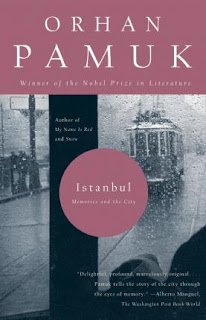How do you write a book to convey to someone the essence of an
entire city? Especially a city as historically and culturally complex as
Istanbul. Moreover, is it possible to do so with any kind of objectivity
when one’s personal experiences of a place shape one’s impression of it. Istanbul is by no
means a travel guide but it definitely succeeds in giving the “feel” of the
city. Orhan Pamuk does a magnificent job of bringing together history,
architecture, art, sociology, and his own memoire to produce that
feeling.
Pamuk explores various medium which Istanbul has been perceived and discussed in the west and how this dialogue affected how Istanbul intellectuals and artists see their city. He argues that this is not a true reflection of the city but a westernised and romanticised version; because historically there was so much pressure for Istanbul to become westernised the opinions of the west were lapped up without much criticism or self-reflection by the Istanbul intellectuals. This resulted in a disconnect between how the common people felt about their city and how the intellectuals described it.
Reading Istanbul made me reflect on Foucault’s argument about knowledge and power. The city’s academics and artists were the ones who held the knowledge of the psychology of the city. While pertaining to speak the truth, their views were in reality influenced by more powerful knowledge holders from the West: more powerful because Westernisation became synonymous with civilisation.
By the same token, Pamuk realises that his opinion of the city is also coloured by his moods which are affected by his relationship with his parents, friends and his lovers. Places he had been before with a heavy heart and which appeared dark and depressing were more positive when he visited them as a middle aged man at peace with himself.
Writing this review also made me think about how people perceive themselves and the way people try to control the way they are perceived by others via exposure in Facebook, Instagram and the like. It may be comforting or disturbing (depending on the subjective opinion) to think that what others think of you is not actually what you are. Further, what you think of yourself is affected by how you are feeling and your relationship with others – whose personalities you have little control over.
A guide to a location, such as a travel guide, often display the opinion of the author so the reader loses him or herself in the subjectivity which prejudices their own experience. Where it comes to describing foreign destinations and its people, travel guides often denigrate to stereotyping or exoticising: resulting in vapid statements such as “the locals love to ride bicycles” (excerpt from the Lonely Planet). What makes Istanbul different is Pamuk’s realisation of and interaction with this process.
Pamuk explores various medium which Istanbul has been perceived and discussed in the west and how this dialogue affected how Istanbul intellectuals and artists see their city. He argues that this is not a true reflection of the city but a westernised and romanticised version; because historically there was so much pressure for Istanbul to become westernised the opinions of the west were lapped up without much criticism or self-reflection by the Istanbul intellectuals. This resulted in a disconnect between how the common people felt about their city and how the intellectuals described it.
Reading Istanbul made me reflect on Foucault’s argument about knowledge and power. The city’s academics and artists were the ones who held the knowledge of the psychology of the city. While pertaining to speak the truth, their views were in reality influenced by more powerful knowledge holders from the West: more powerful because Westernisation became synonymous with civilisation.
By the same token, Pamuk realises that his opinion of the city is also coloured by his moods which are affected by his relationship with his parents, friends and his lovers. Places he had been before with a heavy heart and which appeared dark and depressing were more positive when he visited them as a middle aged man at peace with himself.
Writing this review also made me think about how people perceive themselves and the way people try to control the way they are perceived by others via exposure in Facebook, Instagram and the like. It may be comforting or disturbing (depending on the subjective opinion) to think that what others think of you is not actually what you are. Further, what you think of yourself is affected by how you are feeling and your relationship with others – whose personalities you have little control over.
A guide to a location, such as a travel guide, often display the opinion of the author so the reader loses him or herself in the subjectivity which prejudices their own experience. Where it comes to describing foreign destinations and its people, travel guides often denigrate to stereotyping or exoticising: resulting in vapid statements such as “the locals love to ride bicycles” (excerpt from the Lonely Planet). What makes Istanbul different is Pamuk’s realisation of and interaction with this process.
